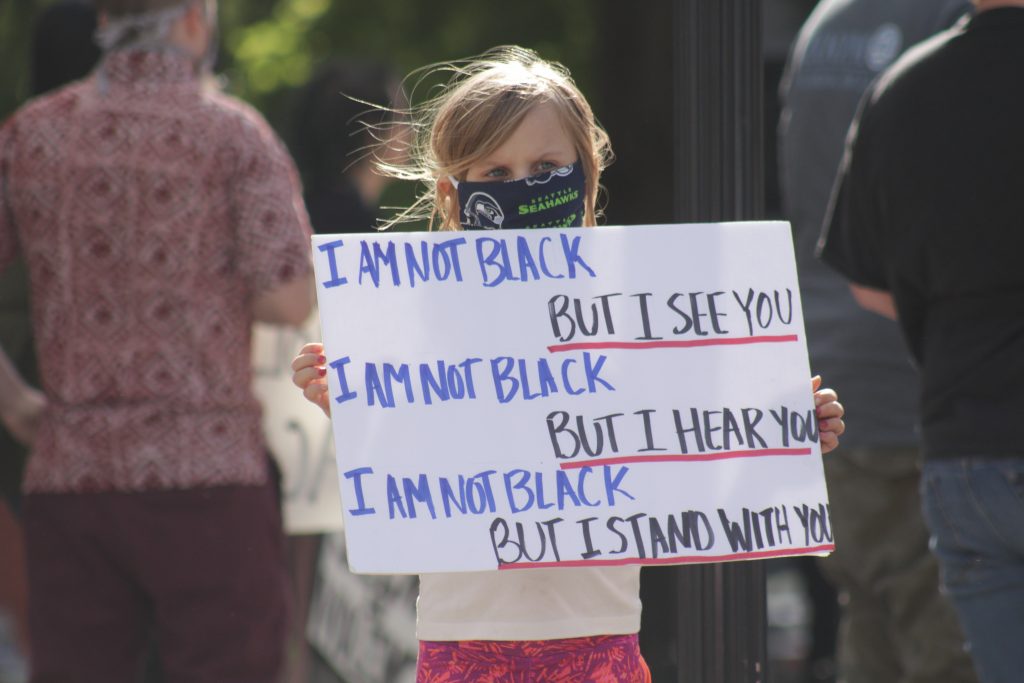The Palouse hosted another solidarity protest this week, this time at Friendship Square in downtown Moscow.
The event, called the Palouse Demands Justice Vigil, is one of many demonstrations erupting across the U.S. in response to the actions of a former Minneapolis police officer charged with the death of George Floyd, a black man.
The white officer, Derek Chauvin, was captured on video pressing his knee into Floyd’s neck for eight minutes and 46 seconds. Floyd could be heard pleading “I can’t breathe,” repeatedly before he eventually became unresponsive.

Chauvin, originally fired charged with third-degree murder and second-degree manslaughter, was charged with second-degree murder on Wednesday, according to an article from the New York Times. The same day, Minnesota’s attorney general Keith Ellison announced the three Minneapolis police officers who failed to intervene in Floyd’s death have been charged with aiding in his death.
“It’s important for those of us living in rural communities to create direct paths of solidarity between the rural spaces we call home and the metropolitan areas that have more opportunities for organized revolt,” the event’s Facebook page stated. “Help us imagine a world without police, without prisons, without bondage.”

Participants at the vigil gathered on both sides of Main Street near Friendship Square, cheering and displaying their messages to people in passing cars, many of whom honked their support or raised a fist out of their window. Some of the signs read “Black Lives Matter,” “Defund the police,” “No justice, no peace,” and “Death to white supremacy.”
Matt Faupusa, one of the attendees and a student at the University of Idaho, said police brutality means living out of fear every single day.
“Cops are supposed to be the ones protecting us, but being a (person of color) living in America, you have this fear that you need to act a certain way or your life can be on the line,” Faupusa said. “It’s scary sometimes.”
Another protestor, Molly Fredriksson, said she included a link to the Minnesota Freedom Fund on her poster as a call to action for other white people who want to create change and help the movement.

“It’s great to have signs that say Black Lives Matter, but we also wanted a call to action. You have to sign petitions, you have to donate and you have to have those hard conversations in the white community,” Fredriksson said. “We can use our privilege to better how the white community sees the black community.”
Latah County Sheriff Richard Skiles, Moscow Police Department (MPD) Chief James Fry and several other officers were also in attendance, watching from the sidelines as they interacted amongst themselves. They occasionally spoke with bystanders and vigil attendees.
While most people at the vigil wore masks to prevent the spread of COVID-19, none of the officers wore them. The CDC recommends the use of cloth face coverings in addition to social distancing to prevent the spread of COVID-19.

In a statement released Wednesday, Fry asked that the community not to judge MPD by the standards of other police departments across the nation.
“I do not and will not tolerate any use of excessive force,” Fry said in the statement. “We are committed to providing a professional, ethical police service at all times and especially during these difficult times.”
Skiles said the number of police officers in attendance was to make sure everyone stayed safe and no one hijacked the event. Four to eight officers were in attendance, according to Argonaut reporters.
The vigil, which lasted from 11 a.m. to 5 p.m., followed Sunday’s Pullman protest which took place with the full support of the local police department (PPD), who condemned Chauvin’s actions in a statement released Friday.

Candles, literature and snacks were available at the vigil alongside lists of organizations and bail funds accepting donations.
For one black resident at the event, moving to northern Idaho wasn’t an easy decision.
“My family told me never to move here,” Sharlisa Davis said. “They said this place is not welcoming to black people.”
Luckily, Davis met Jane Pritchett, who helped her make the transition.

Davis gestured to her friend, who was with her at the vigil.
“She told me I’d be fine,” Davis said. “And she’s been with me this whole time.”
Now, Davis serves as a volunteer with the Latah Human Rights Taskforce.
Davis said her hope with the vigil is for people to see black folks for who they are, rather than the color of their skin.
“I want people to ask me questions,” Davis said. “I don’t want them to see me as just another black person, I’m more than that.”
Angela Palermo can be reached at arg-news@uidaho.edu or on Twitter @apalermooo
